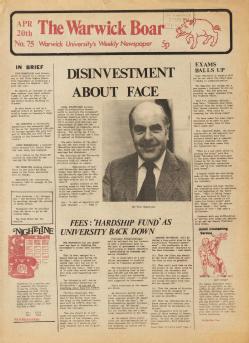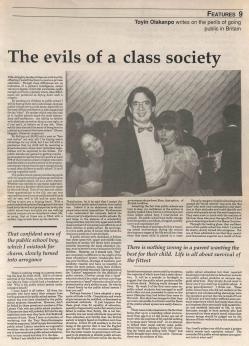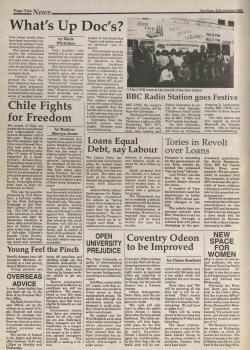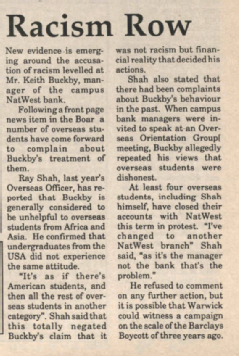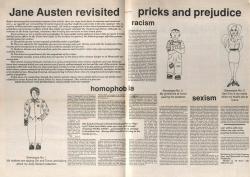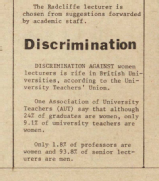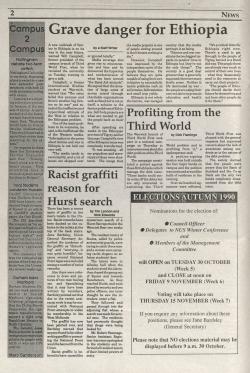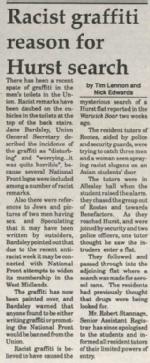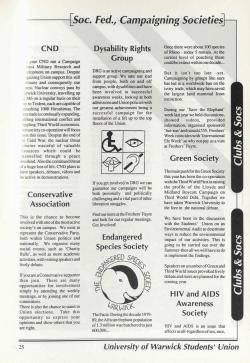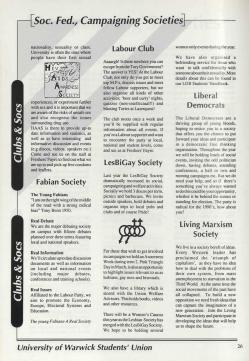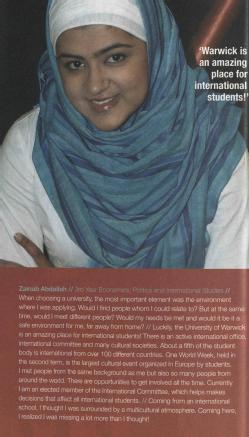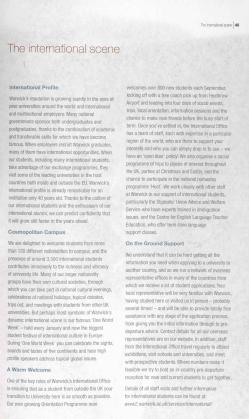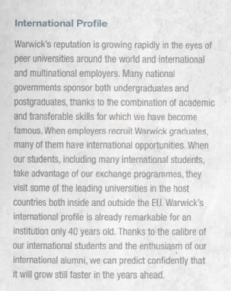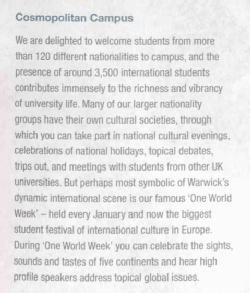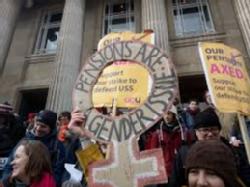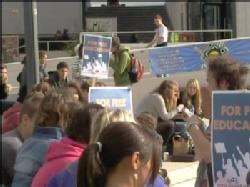Inclusivity & Accessibility
Through speaking to alumni and professors, we have unearthed a significant shift in Warwick’s community to become more inclusive. Speaking to Katherine, she describes how students from less affluent backgrounds often felt that they did not fit into the university community, with the progression to university mostly restricted to those from well off backgrounds.
One
bad memory from an education seminar, where about 20 of us were in a
circle and uh, the guy, the professor said “oh let’s go round the
circle and say your name and where you’re from” cause it must
have been early days and I said “I’m
Katherine and I’m from Nuneaton” and he went [in an exaggerated
accent] “ah Nuneaton, we’ve got a local girl”
and he just… I
was so embarrassed that he
had made fun of my accent and I realised at that moment that even
amongst the mature students who were quite local, I was the only one
with a local accent. And I
just… half of me was embarrassed and half of me was outraged, how
dare he dough me in for having a local accent. Um, I did find
somebody on the course from Tamworth who had an accent as strong as
mine, so we chummed up, we were friends for a bit.
But yeah there was that side of things. I don’t imagine it’s as bad now but back then you still had to be of a certain class really to get into university, umm a lot of my friends from my local school… I was in the top class at school, with really intelligent people, the vast majority of whom did not go to university because it just wasn’t in their culture to go.”
Most people back then, you didn’t go to university unless you were from a fairly middle-class background to be honest, and um… I do remember one girl who I loved, she was so nice, Sue, couldn’t cope… our first teaching experience they took us into Chelmsley Wood in Birmingham and, oh, there was all these ruffian kids running around and we came back and we had to do kind of feedback from it and this poor Sue said “Oh My Goodness” she said “I don’t know if I am on the right course, I went to a Convent school, I’ve never seen anything like it”. She was lovely and it was fairly clear from the lectures we went to she was going to be a really great teacher actually, she’s probably in a private school somewhere. Somewhere nice. But I loved her to bits, she was so honest about you know… about it being way beyond her scope of experience. That is kind of the sort of people that went to university.” Katherine, Education, English and RE with QTS, 1990-1994
This lack of diversity in the early Warwick years was paralleled within the academic staff. Reflecting on the changes that his department, -Politics and International Studies (PAIS)- has undergone, Wyn Grant explains how the department has become much more diverse in terms of academic staff, compared to when the department was founded.
It
certainly wasn’t very diverse in terms of its composition [PAIS
department in 1971]. Everyone in the department was a white male and
quite a few of those were Scottish. The
head of the department in the 1970’s would not appoint a woman
under any circumstance. In
one case, a perfectly good and indeed quite strong woman candidate
was simply not shortlisted. She got the job at Manchester University.
She
was clearly very capable, and
the
head of department wasn’t going to have any women because he
thought they were trouble.
When we got to the 1990’s,
there’s a greater expansion both
in the university and the department which gives the opportunity to
recruit
new sorts of people, and also the recognition of the fact that there
was also an imbalance in the composition of the department.”
Wyn
Grant, Emeritus Professor at Warwick
Despite these improvements, issues of inclusivity have not been fixed. Within universities and the Arts especially, it remains clear that there remains a lack of diversity within the student cohorts. The Royal Historical Society conducted a report into the racial inequalities and discrimination within historical study within UK, and the resulting report highlights:
Underrepresentation
of ‘Black and Minority Ethnic’ (BME) students and staff in
university History programmes,
the substantial levels of race-based
bias and discrimination experienced by BME historians in UK
universities, and the negative impact of narrow school and university
curriculums on diversity and inclusion.”
(Royal
Historical Society,
2018)
The results of this report, alongside the rise of decolonising movements such as RhodesMustFall, demonstrate that we still have a long way to go before the University community is truly inclusive.
Speaking to a more recent alumni, Pierre, he explained how as someone from the North of England he felt uncomfortable joining his department society.
Were you much involved with the French Department Society?
Almost
not at all, I think... this
is probably just me being like prejudiced unnecessarily [but] you
sort of looked at the people who were on the exec [and thought] it is
not really going to be a place where I fit in [a]s someone from the
North of England
[…] I am sure in reality they did
lots of really nice things. I know people who are in the History and
French Societies now, students that I’ve taught, they seem by all
accounts very useful bodies, unless they just got better [since I was
an undergrad].”
Pierre,
French and History, 2011-2015
The drastic increase in university tuition fees within the last decade, left one alumnus, Katherine concerned that improvements in accessibility to universities would be reversed. Speaking about her experiences accessing university education, Katherine worried that were she making this decision today, she might not have undertaken her degree.
I
feel very lucky that financially I didn’t have to take on any kind
of burden to go there and I loved it, I really enjoyed the course...
But
just the whole experience was really good and I just feel privileged
I did it at a time when I didn’t have to pay and I think that is
how it should still be… if
I had had to take on a loan to do it, I wouldn’t have done it,
and if I was 18 now I would not be going to university. So yeah, I
wouldn’t be doing it and I think that’s sad really and I think a
lot of people from my sort of background won’t take up that
option.”
Katherine,
Education, English and RE, 1990-1994

